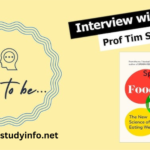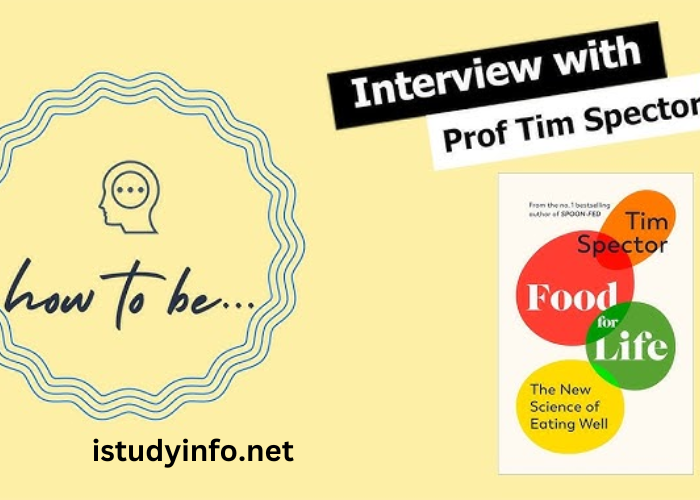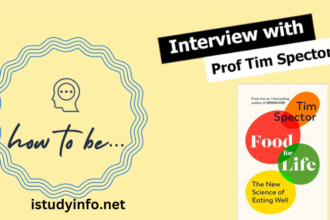In today’s world, there is an overwhelming amount of information about food and nutrition, often leading to confusion about what truly contributes to a healthy lifestyle.Food for Life: The New Science of Eating Well, by the #1 Bestselling Author of Spoon-Fed, offers a fresh perspective on this topic by cutting through the noise and focusing on scientifically-backed evidence about how we should approach food and nutrition. Written by the renowned author who brought usSpoon-Fed, this book dives into the latest scientific findings about food, health, and wellness, offering practical advice on eating well.
This book is an essential read for anyone looking to make better dietary choices, free from the influence of diet fads or misinformation. It emphasizes sustainable, evidence-based nutrition practices that anyone can implement in their daily life. By combining rigorous science with real-world application,Food for Life: The New Science of Eating Well, by the #1 Bestselling Author of Spoon-Fed offers clear and concise guidance for those who want to optimize their health through food.
Key Points:
- Food for Life: The New Science of Eating Well, by the #1 Bestselling Author of Spoon-Fed introduces evidence-based nutrition practices.
- The book clears up common misconceptions surrounding food and health, guiding readers toward healthier choices.
- The author emphasizes a sustainable and realistic approach to eating well that anyone can incorporate into their life.
What Makes Food for Life: The New Science of Eating Well Different from Other Nutrition Books?
Unlike many other nutrition books that often promote diet fads or quick-fix solutions,Food for Life: The New Science of Eating Well, by the #1 Bestselling Author of Spoon-Fed, stands out by focusing on long-term, scientifically validated strategies. The author addresses how our diets affect not only our health but also our environment and well-being. Instead of offering one-size-fits-all advice, this book encourages readers to understand the science behind nutrition so they can make educated, sustainable choices for themselves.
The book delves into current scientific studies that explore how different foods impact our bodies, immune systems, and overall longevity. The goal is not just to follow trends but to make informed decisions based on sound scientific evidence.
How Does Food for Life: The New Science of Eating Well Help Us Understand the Science Behind Nutrition?
InFood for Life: The New Science of Eating Well, by the #1 Bestselling Author of Spoon-Fed, the author explains how food science has evolved and how it plays a critical role in maintaining good health. With advancements in nutritional research, scientists have discovered the complex relationship between food, metabolism, and disease prevention.
The book goes deep into the biochemistry of food, breaking down the essential nutrients, vitamins, and minerals required for optimal bodily function. For example, it covers how antioxidants help protect cells from damage, the importance of gut health, and why the body needs certain fats and proteins to function effectively. This detailed explanation allows readers to understand why specific foods work in specific ways.
What Are the Key Concepts Discussed in Food for Life: The New Science of Eating Well?
Food for Life: The New Science of Eating Well, by the #1 Bestselling Author of Spoon-Fed, touches on several important concepts regarding healthy eating. Some of the key topics discussed include:
- The Importance of Whole Foods: The book advocates for a diet rich in whole, unprocessed foods, explaining how these provide vital nutrients in their most natural form.
- Balancing Macronutrients: The author explains how the right balance of carbohydrates, fats, and proteins is essential for energy and overall health.
- Plant-Based Nutrition: A significant focus is placed on the health benefits of plant-based diets, not just for weight management but for preventing chronic diseases.
- Personalization of Diet: While there are general guidelines for everyone, the book emphasizes the importance of tailoring your diet to fit your individual health needs, which may vary based on genetics and lifestyle.
These core concepts serve as a framework to build a diet that promotes long-term health and wellness, without relying on restrictive or unsustainable eating patterns.
How Can Food for Life: The New Science of Eating Well Help You Make Healthier Food Choices?
Food for Life: The New Science of Eating Well, by the #1 Bestselling Author of Spoon-Fed, equips readers with practical tools to make better food choices daily. The book simplifies the complex science of nutrition, enabling anyone to understand what their body needs and how they can provide it through food. This practical approach makes it easier to apply the book’s teachings to real-life situations, such as meal planning, grocery shopping, and dining out.
By explaining how food interacts with our bodies, the book empowers readers to identify which foods are best for boosting energy, improving mood, or preventing illness. The focus on mindful eating encourages you to enjoy your food while also being mindful of its impact on your health.
How Does Food for Life: The New Science of Eating Well Challenge Common Dietary Myths?
One of the strengths ofFood for Life: The New Science of Eating Well, by the #1 Bestselling Author of Spoon-Fed is how it addresses and dispels numerous dietary myths that have persisted for years. For example, the book tackles the misconception that all fats are bad for you. In reality, certain fats, such as those found in avocados, nuts, and olive oil, are essential for good health and can help lower cholesterol levels.
The book also challenges the myth that carbohydrates should be avoided, showing how complex carbohydrates, such as those found in whole grains and vegetables, are an important source of sustained energy. By providing scientific evidence to debunk these myths,Food for Life: The New Science of Eating Well helps readers make informed decisions that are based on facts, not trends or hearsay.
Why Is Food for Life: The New Science of Eating Well Important for Sustainable Health?
InFood for Life: The New Science of Eating Well, by the #1 Bestselling Author of Spoon-Fed, the author emphasizes the importance of adopting a sustainable approach to eating. Unlike fad diets that may promise quick results but are often difficult to maintain, the book advocates for lasting dietary habits that prioritize health over short-term fixes.
Sustainability in eating is not only about making healthy food choices but also about considering the environmental impact of food production. The author discusses how choosing sustainable, locally grown, and seasonal foods can contribute to better health and a better planet.
How Can Food for Life: The New Science of Eating Well Improve Your Overall Well-being?
The ultimate goal ofFood for Life: The New Science of Eating Well, by the #1 Bestselling Author of Spoon-Fed is to help readers improve their overall well-being. By following the science-based guidelines offered in the book, individuals can expect to see improvements in various aspects of their life, including increased energy, better digestion, improved mental clarity, and even enhanced mood.
The book stresses that food is not just fuel but has a profound impact on both physical and mental health. By adopting a well-balanced diet based on scientific research, readers can experience improved longevity and a higher quality of life.
How Does Food for Life: The New Science of Eating Well Address Food and Disease Prevention?
Another key aspect ofFood for Life: The New Science of Eating Well, by the #1 Bestselling Author of Spoon-Fed is its focus on how food can be a preventive tool against chronic diseases. The author explores the link between diet and several conditions such as heart disease, diabetes, and obesity. By focusing on nutrient-rich, anti-inflammatory foods, individuals can reduce the risk of developing these conditions.
The book offers practical advice on how to build a diet that supports disease prevention, including incorporating antioxidant-rich foods, maintaining a healthy gut microbiome, and reducing inflammation through diet.
Conclusion
Food for Life: The New Science of Eating Well, by the #1 Bestselling Author of Spoon-Fed, is an invaluable resource for anyone looking to improve their eating habits and overall health. It offers a unique combination of scientific evidence and practical advice, empowering readers to make informed choices that can have a lasting positive impact on their lives.�
With a focus on sustainable, plant-based nutrition, this book challenges the myths surrounding food while offering clear guidance on how to eat for long-term well-being. Whether you’re looking to improve your health, prevent disease, or simply eat more mindfully,Food for Life: The New Science of Eating Well is the perfect guide to help you achieve your goals.
FAQs
- What is Food for Life: The New Science of Eating Well about?
Food for Life: The New Science of Eating Well, by the #1 Bestselling Author of Spoon-Fed, is a book that focuses on the science behind healthy eating and how to make better food choices based on scientific evidence. - Is Food for Life: The New Science of Eating Well suitable for people looking to lose weight?
Yes,Food for Life: The New Science of Eating Well provides guidance on creating a balanced diet that supports overall health and can contribute to weight loss when combined with regular physical activity. - Does the book provide practical tips for daily meals?
Yes,Food for Life: The New Science of Eating Well includes actionable tips for planning meals, grocery shopping, and dining out, making it easy to incorporate its advice into daily life. - Can Food for Life: The New Science of Eating Well help with disease prevention?
Yes, the book explores how a nutrient-rich diet can help prevent chronic diseases such as heart disease, diabetes, and obesity. - How does Food for Life: The New Science of Eating Well differ from other nutrition books?
Unlike fad diet books,Food for Life: The New Science of Eating Well is based on scientifically-backed evidence, offering practical, sustainable eating habits that are easy to maintain in the long term.












